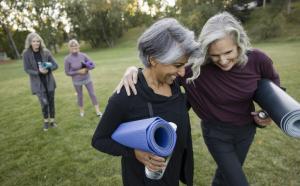Preparing for Longer Life

While living longer does not necessarily mean good health or a high quality of life, longer life expectancy is something to celebrate, even if it presents enormous challenges.
As the age of the population increases, so does the scientific work to understand the biological process of aging. Experts in aging medicine argue that the process is neither inexorable nor predetermined and can be slowed and even reversed through a variety of approaches. These include activating the body's defenses against aging, eliminating senescent cells (cells that are aged but still active and releasing harmful substances that cause inflammation), and reprogramming cells in vivo. Doing so could help treat both rare and common illnesses, including mitochondrial diseases, type 2 diabetes, Alzheimer's disease, cardiovascular disease, and cancer.
While these and newer investigations advance in the laboratory field, specialists say there are other factors related to our organism’s abilities that decline naturally over time and should be considered:
Muscle mass and coordination. Blamed for falls that can seriously deteriorate one’s health, chronic conditions, and even early admission to nursing homes, loss of muscle mass — known in medical jargon as sarcopenia — affects 5 to 13% of people in their early 60s to late 70s and can rise to 50% among older groups. One of the most important causes of reduced strength and coordination is simply a lack of physical activity. There is a myth that as a person gets older, it’s acceptable to engage in less exercise, but in fact, the opposite is true.
Eyes and vision. Time impacts the quality of the eyes and vision. We lose the ability to see up close, to distinguish colors such as blue from black, to see at night, or to adapt quickly to changes in light levels. These problems usually improve by wearing glasses or contact lenses and using the right light for work or home activities. Don’t forget to protect your eyes from the sun with glasses that block ultraviolet rays.
Memory and brain function. When we think of aging, the brain is one of the first organs that come to mind. Keeping the brain active is almost a universal motto to ward off the ghosts of old age, keep memories intact, and prevent conditions such as Alzheimer's. But taking care of cardiovascular health and staying active is.
Four things you can start doing today:
- Walking more. A simple walk around the house or in a park — done mindfully, engaging all the muscles, including the arms — helps to strengthen muscle mass. If this exercise is done consistently, it will have a more lasting effect.
- Practice exercises that help with strength and balance. When performed at least two hours per week, Tai Chi, yoga, or Pilates work the muscles without exposing them to extreme stress and improves other aspects of adult life: balance, breathing capacity, flexibility, and stress.
- Consume more nutrients. As you age, your body's needs change. It may need fewer calories, but it still requires enough nutrients. Some older adults need more protein.
- Don't isolate yourself. Communicate with family, friends, and colleagues about your needs and activities. Loneliness and social isolation affect many people in the United States and put them at risk for dementia and other severe medical conditions.
- Review your health insurance plan.
If you need more information, call us at (844) 303-2233. Drop us a line at Healthinsurance@holadoctor.net
© 2025 Pan-American Life
